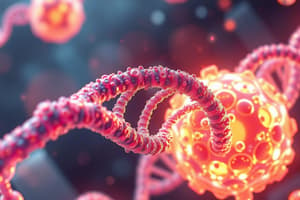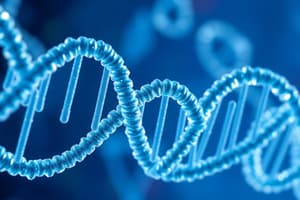Podcast
Questions and Answers
What will happen if the target DNA also possesses the same Restriction Site as the adaptors?
What will happen if the target DNA also possesses the same Restriction Site as the adaptors?
- The adaptors will produce new DNA with modified ends
- The adaptors will not be able to bind to the target DNA
- The adaptors will bind only to the target DNA
- The adaptors' sticky ends will bind with each other (correct)
Why is DNA ligase unable to form a phosphodiester bridge between the 5-OH and 3-OH ends of adaptors?
Why is DNA ligase unable to form a phosphodiester bridge between the 5-OH and 3-OH ends of adaptors?
- The adaptors cannot bind to DNA molecules
- The adaptors lack phosphate groups (correct)
- The adaptors' ends are not complementary
- The adaptors have abnormal termini
What enzyme is used to convert the abnormal 5-OH terminus of adaptors to the natural 5-P form?
What enzyme is used to convert the abnormal 5-OH terminus of adaptors to the natural 5-P form?
- RNA ligase
- Polynucleotide kinase (correct)
- DNA polymerase
- Reverse transcriptase
Why are adaptors unable to ligate with themselves?
Why are adaptors unable to ligate with themselves?
What is the purpose of homopolymer tailing (HT) in the context of DNA manipulation?
What is the purpose of homopolymer tailing (HT) in the context of DNA manipulation?
What would be the consequence if DNA ligase was able to bridge between the 5-OH and 3-OH ends of adaptors?
What would be the consequence if DNA ligase was able to bridge between the 5-OH and 3-OH ends of adaptors?
Why is it essential that the abnormal 5-OH terminus of adaptors is converted to the natural 5-P form before vector insertion?
Why is it essential that the abnormal 5-OH terminus of adaptors is converted to the natural 5-P form before vector insertion?



